The setec Foundation is involved in two systemic projects run by the SEED association in the Saint-Louis region in Senegal.
SEED (Solidarity, Equity, Empowerment, Development) is a local and international solidarity association. It works mainly in the fields of participatory urban planning and citizen participation, to improve the living environment of civil society. The association builds its projects around two axes: consultation and participative construction.
The association is based in Lille, which is twinned with its Senegalese counterpart Saint-Louisianne.
Projects
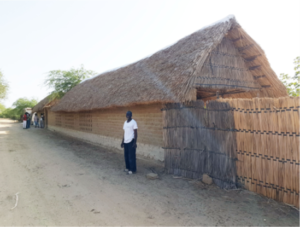
Project 1: KER ALAAM GI, the Environment House in partnership with the City of Saint-Louis, a project supported by the setec Foundation as part of the 2021 Annual Campaign on Sustainable Construction in Africa.
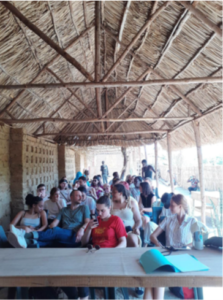
This ecological and economic development project aims to reduce poverty through the creation of an integrated resource center dedicated to the environment, using local bio-sourced materials (typha earth) close to the mangrove. 4 responsible trainings, including 2 in sustainable construction, are deployed. This place lives through the commitment of the entire community.
Project 2: DAARA ALAM GI, biorenovation of a classroom in a school in the city of Saint-Louis, a project supported by the setec Foundation in 2022.
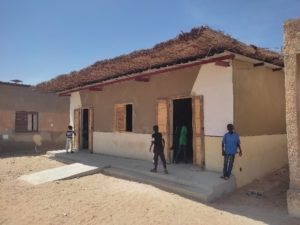
This project offers bio-sourced construction solutions for a public building to improve working conditions for teachers and study conditions for children. Training courses have been set up to enhance good building practices to support the resilience of local communities and encourage individual, collective and public involvement in the area.
These two projects have much in common. Indeed, they are the result of collaboration between local operational and institutional partners. In the case of the second project, the partnerships go even further, beyond local borders, with the City of Lille and a higher education establishment.
The various stakeholders
These two projects were co-constructed with :
- SEED, the association coordinating the projects
- The local economic intereste group (GIE Suxali Alaam), the main contractor, providing its team and expertise.
- Local construction professionals and craftsmen with their expertise, who are trained during construction.
- Local residents, who will benefit from awareness-raising activities on best practices for better management of natural resources.
- The setec Foundation, with financial and technical support from Adramé Ndiaye of setec Afrique.
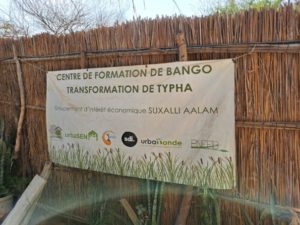
The first project directly benefits local residents, who can attend awareness-raising events on best practices for better natural resource management.
As for the second project, it has benefited from the support of the City of Lille, which works to manage partnerships between local institutional players for a change of scale, as well as with two Lille schools to share knowledge and skills. Local teachers and pupils are the direct beneficiaries, seeing their teaching conditions improved.
Results and impact
The bio-construction of two public buildings took the form of participative worksites: the Maison de l’Environnement and the school. Beneficiaries become agents of change by participating in and learning about the eco-construction of the buildings, which will become training and knowledge centers and resource centers.
Collaboration between stakeholders has led to a systemic change in the way local communities conceive of their immediate environment. These places have become incubators for experimentation to accompany the transition in the City of Saint-Louis’ planning policy, as well as tools to support public decision-making in the sustainable development of collective spaces.
Testimonials
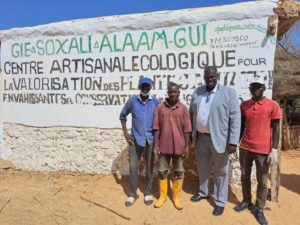
Adramé N’Diaye, setec Afrique engineer, project sponsor:
“Sponsoring these projects has enabled me to work with local stakeholders, which has been an honor and a great privilege for me, and I have taken on my role as representative of the Foundation with great pleasure and pride.”
Nina Porret, project coordinator for the SEED association:
“The SEED association has been working in the Saint-Louis region (Senegal) since 2019. Our “Ker Alaam Gi” project – launched in January 2022 and financed by the SETEC Foundation -, was an opportunity to enhance the know-how of a local Economic Interest Group (EIG) linked to the transformation of typha, a local reed, into a building material, for the construction of a local Maison de l’Environnement. The coordination of players involved in the valorization of bio-sourced materials in the construction field, whether on a local scale (local GIE and local population, expertise in use and artisanal know-how), a national scale (Elementerre company, expertise in local materials), or an international scale (CRAterre school, research and training in bio-sourced materials), has given rise to this experimental project, a genuine demonstrator of bio-sourced techniques and a means of raising awareness of environmental resources on a local scale.
Around this first group of players, a new synergy was born from relations with decentralized cooperation players between the City of Lille and the City of Saint-Louis, enabling the implementation of the “Daara Alaam Gi” project – Ecole de l’Environnement (2023): a new field of experimentation enabling the rehabilitation and reconstruction of school buildings using bio-sourced materials. This pilot project has brought together a local GIE (skills reinforcement), local craftsmen (awareness-raising and training in biosourced construction techniques) and students from the Ecole Nationale Supérieure d’Architecture et de Paysage de Lille (support for the design and implementation of the worksite), supported by the two local authorities.”
